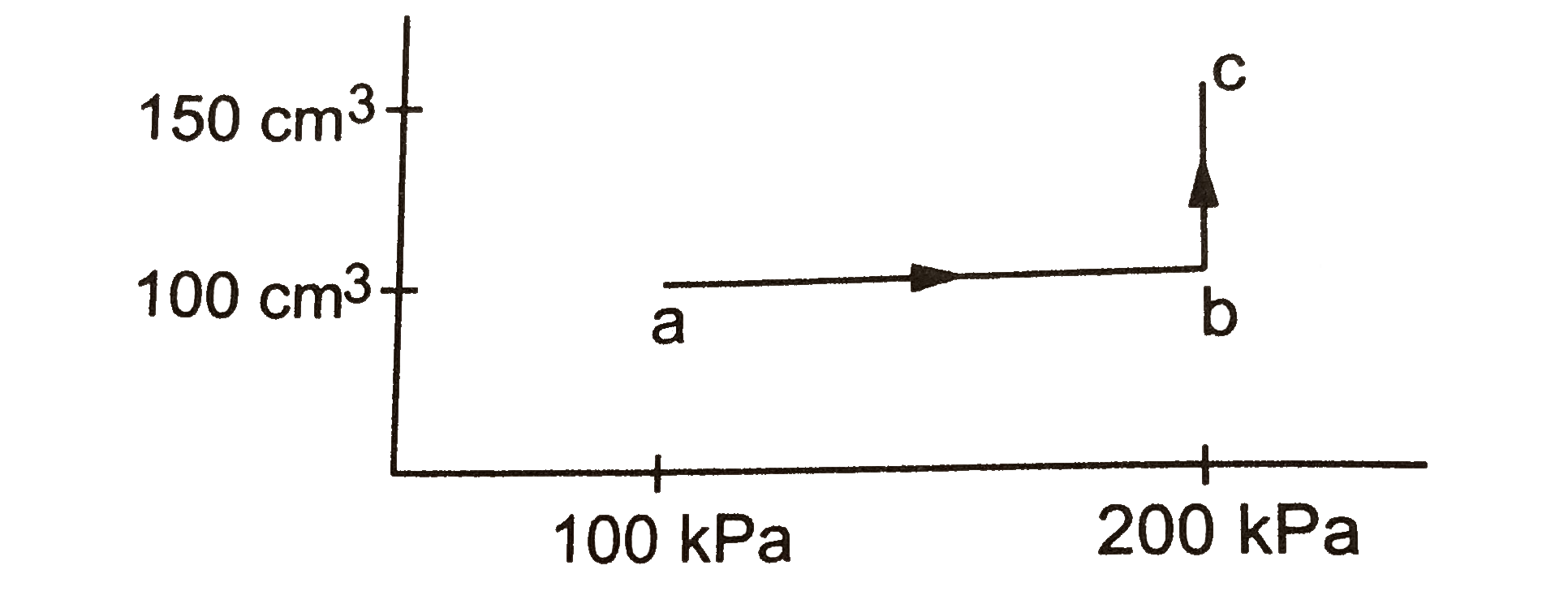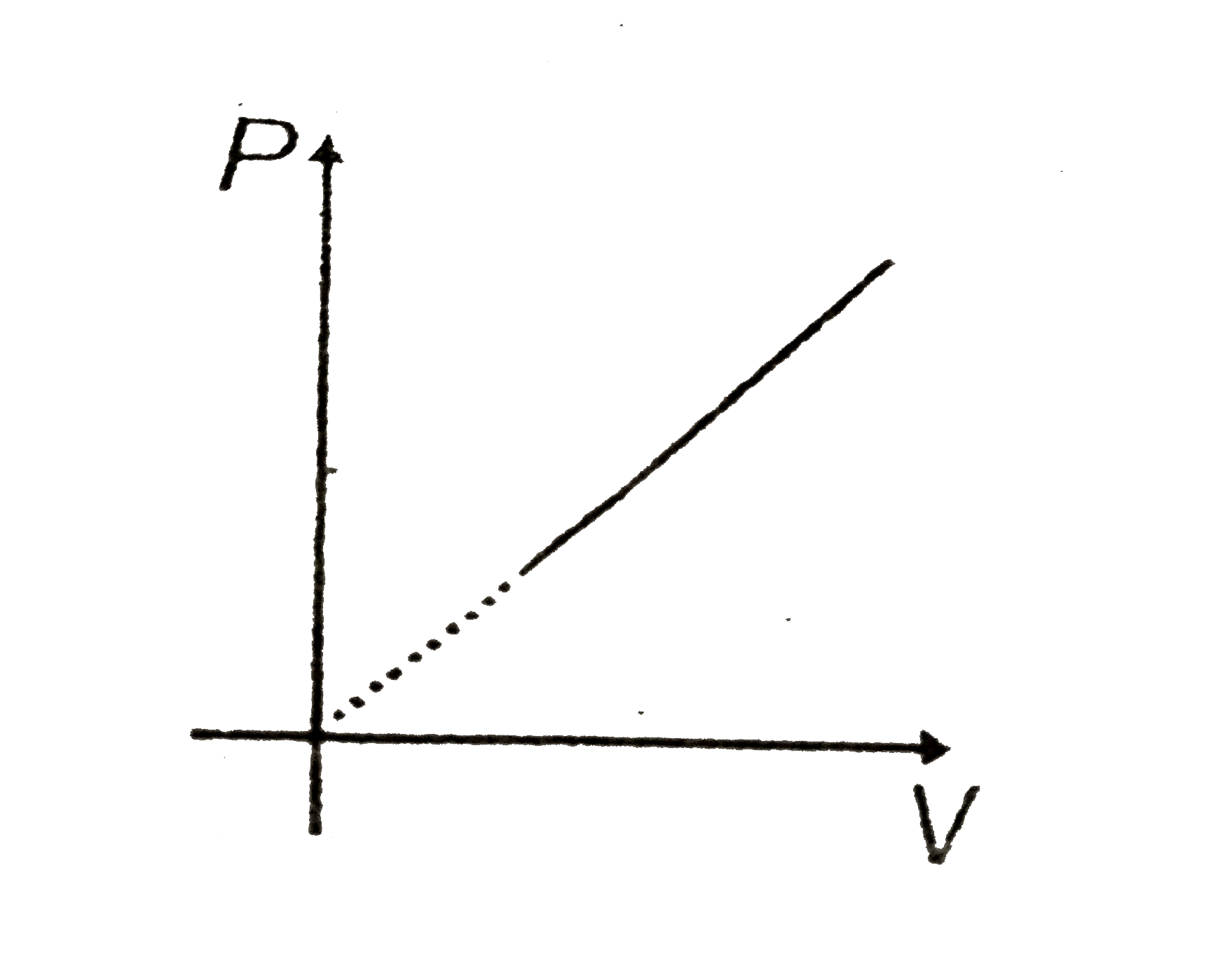An ideal gas (CpCv=γ) is taken through a process in which the pressure and volume vary as (p=aVb). Find the value of b for which the specific heat capacity in the process is zero.
The correct Answer is:−γ
To solve the problem, we need to find the value of b for which the specific heat capacity in the process is zero. We start with the given relationship between pressure p and volume V:
p=aVb
Step 1: Understand the condition for zero specific heat capacity
The specific heat capacity C in a process is defined as:
C=dqdT
where dq is the heat added to the system and dT is the change in temperature. If C=0, it implies that no heat is exchanged during the process, which characterizes an adiabatic process.
Step 2: Identify the relationship for an adiabatic process
For an adiabatic process involving an ideal gas, the relationship between pressure and volume is given by:
PVγ=constant
where γ=CpCv.
Step 3: Rewrite the adiabatic condition
We can express this relationship in terms of pressure p:
p=kVγ
where k is a constant.
Step 4: Compare the two expressions for pressure
We have two expressions for pressure:
1. From the problem: p=aVb
2. From the adiabatic condition: p=kVγ
Step 5: Set the two expressions equal to each other
Setting the two expressions for p equal gives:
aVb=kVγ
Step 6: Rearranging the equation
Rearranging this equation, we get:
aVb+γ=k
Step 7: Analyze the relationship
For this equation to hold for all V, the exponent of V must be zero (since k is a constant). Therefore, we set:
b+γ=0
Step 8: Solve for b
From the equation b+γ=0, we can solve for b:
b=−γ
Final Answer
Thus, the value of b for which the specific heat capacity in the process is zero is:
−γ
The specific heat capacity C in a process is defined as:
For an adiabatic process involving an ideal gas, the relationship between pressure and volume is given by:
We can express this relationship in terms of pressure p:
We have two expressions for pressure:
2. From the adiabatic condition: p=kVγ
Setting the two expressions for p equal gives:
Rearranging this equation, we get:
For this equation to hold for all V, the exponent of V must be zero (since k is a constant). Therefore, we set:
From the equation b+γ=0, we can solve for b:
Thus, the value of b for which the specific heat capacity in the process is zero is:
Topper's Solved these Questions
- BOOK - RESONANCE ENGLISHCHAPTER - KTG & THERMODYNAMICSEXERCISE - Exercise-21videos
KTG & THERMODYNAMICS
- BOOK - RESONANCE ENGLISHCHAPTER - KTG & THERMODYNAMICSEXERCISE - PART -I15videos
KTG & THERMODYNAMICS
- BOOK - RESONANCE ENGLISHCHAPTER - KTG & THERMODYNAMICSEXERCISE - PART -II17videos
KTG & THERMODYNAMICS
- BOOK - RESONANCE ENGLISHCHAPTER - KINETIC THEORY OF GASES AND THERMODYNAMICSEXERCISE - Exercise64videos
KINETIC THEORY OF GASES AND THERMODYNAMICS
- BOOK - RESONANCE ENGLISHCHAPTER - MAGNETIC FIELD AND FORCESEXERCISE - Exercise64videos
MAGNETIC FIELD AND FORCES
Similar Questions
An ideal gas is taken through a process in which pressure and volume vary as P=kV2. Show that the molar heat capacity of the gas for the process is given by C=Cv+R3.
View SolutionAn ideal gas is taken through a process in which the pressure and the volume are changed according to the equation p=kv. Show that the molar heat capacity of the gas for the process is given by (C=Cv+R2).
View SolutionAn ideal gas is taken through a process in which the pressure and the volume are changed according to the equation p=kv. Show that the molar heat capacity of the gas for the process is given by (C=Cv+R2).
View SolutionFor an ideal gas, the specific heat capacity during an isentropic process is always
View SolutionA gas undergoes a process in which its pressure P and volume V are related as VP = constant. The bulk modulus of gas for this process
View SolutionFind the value of molar heat capacity for an ideal gas in an adiabatic process.
View SolutionA monoatomic gas undergoes a process in which the pressure (P) and the volume (V) of the gas are related as PV−3=constant. What will be the molar heat capacity of gas for this process?
View SolutionAn ideal gas (γ=1.5) undergoes a thermodynamic process in which the temperature and pressure of the gas are related as T−1P2= constant. The molar heat capacity of the gas during the process is
View SolutionAn ideal gas (γ=1.67) is taken through the process abc shown in figure . The temperature at the point a is 300k. Calculate (a) the temperature at b and c, (b) the work done in the process, ( c) the amount of heat supplied in the path ab and in the path bc and (d) the change in the internal energy of the gas in the process.
 View Solution
View SolutionThe variation of pressure versus volume is shown in the figure. The gas is diatomic and the molar specific heat capacity for the process is found to xR. Find the value of x.
 .View Solution
.View Solution
